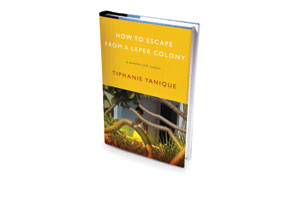Reading Questions for How to Escape from a Leper Colony
Warning: May contain spoilers

Photo: Ben Goldstein/Studio D
1. The characters in these stories have complicated feelings about foreigners, tourism, and race. How do these feelings surface in their actions? Are the differences between islanders and non-islanders reconcilable?
2. The Boston Globe called Tiphanie Yanique a "ventriloquist" because of the drastically different voices in her stories. Is it challenging to read one story in the voice of a gangster in love, and then another in the voice of a Gambian priest, or does the variety make the collection more enjoyable?
3. Many of these characters feel alienated from their family or culture. How do their attempts to adapt to Western culture change their personalities? Is it possible or desirable to ever truly fit in?
4. Religion appears often in this collection, from the Hindu goddess Kali, to a Catholic priest, to a devout Muslim family, to nondenominational Christians. What is the impact of these different faith traditions in the book? How are the religious elements of the book reconciled with the overt sexuality in some of the stories?
5. "The Bridge Stories" is told from three distinct viewpoints. How did this style of narration affect your reading of the story? Does the bridge metaphor in the opening parable extend to the entire book?
6. Why do you think the author chose this title for the book? Is the story "How to Escape from a Leper Colony" representative of all the stories? Does the title itself speak to the themes of all the stories?
7. "Canoe Sickness" and "Where Tourists Don't Go" are the only stories in the collection set outside of the Caribbean. How do they compare and contrast with the other stories in the collection?
8. In stories like "How to Escape from a Leper Colony" and "Street Man," Yanique blends a Caribbean vernacular with more mainstream prose. What is the effect of this juxtaposition?
9. How does the fire function as a symbol in "The Saving Work"? Does its meaning change over the course of the story?
Read O's review
Get more reading guides
2. The Boston Globe called Tiphanie Yanique a "ventriloquist" because of the drastically different voices in her stories. Is it challenging to read one story in the voice of a gangster in love, and then another in the voice of a Gambian priest, or does the variety make the collection more enjoyable?
3. Many of these characters feel alienated from their family or culture. How do their attempts to adapt to Western culture change their personalities? Is it possible or desirable to ever truly fit in?
4. Religion appears often in this collection, from the Hindu goddess Kali, to a Catholic priest, to a devout Muslim family, to nondenominational Christians. What is the impact of these different faith traditions in the book? How are the religious elements of the book reconciled with the overt sexuality in some of the stories?
5. "The Bridge Stories" is told from three distinct viewpoints. How did this style of narration affect your reading of the story? Does the bridge metaphor in the opening parable extend to the entire book?
6. Why do you think the author chose this title for the book? Is the story "How to Escape from a Leper Colony" representative of all the stories? Does the title itself speak to the themes of all the stories?
7. "Canoe Sickness" and "Where Tourists Don't Go" are the only stories in the collection set outside of the Caribbean. How do they compare and contrast with the other stories in the collection?
8. In stories like "How to Escape from a Leper Colony" and "Street Man," Yanique blends a Caribbean vernacular with more mainstream prose. What is the effect of this juxtaposition?
9. How does the fire function as a symbol in "The Saving Work"? Does its meaning change over the course of the story?
Read O's review
Get more reading guides



